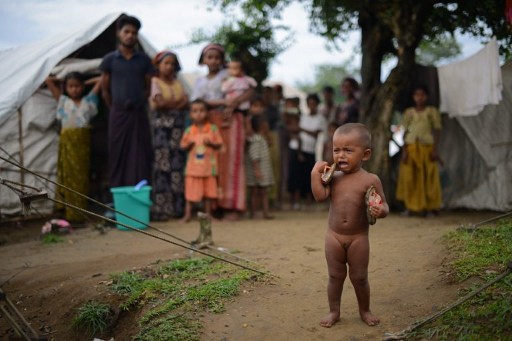All internally displaced person (IDP) camps in Arakan State should be closed down—that is the recommendation of the commission tasked with investigating the problems in the conflict-marred region.
Speaking at a press conference today in Rangoon, Commissioner Ghassan Salamé, a former Lebanese minister of culture and advisor to the UN secretary-general, unveiled 13 interim recommendations on behalf of the Arakan Advisory Commission.
Alongside a call to shut down the IDP camps, chief points raised by the commission included calls for: unimpeded humanitarian and media access; the training of security forces in human rights; inter-communal dialogue; and unrestricted freedom of movement.
Assuming the reins in the absence of the Advisory Commission Chairman Kofi Annan, Salamé addressed the Burmese government, saying the commission’s findings “necessitate urgent action.”
Salamé closed with the comment: “Let me be frank. Everybody needs to do their own job and we are not an investigation committee. We are not equipped with forensic capability … We are here to listen.” He then added: “We do endorse of course an impartial and independent investigation into what happened,” in reference to the 9 October attacks last year in Maungdaw where nine Burmese border policemen were killed.
The international report follows a meeting of the UN Human Rights Council this week in Geneva where the issue of Arakan State and the Rohingya crisis was tabled. In addition, UN Special Rapporteur Yanghee Lee again urged the formation of an independent commission to investigate the alleged human rights abuses in the beleaguered western Burmese state. She also warned that if it is not formed quickly, the Rohingya population could continue to endure serious human rights abuses.
Paramount among the Arakan Advisory Commission’s recommendations was the call to close all IDP camps. More than 120,000 Muslims are confined to cramped and primitive conditions inside the camps, which are mostly dotted around northwestern Arakan State. The camps were established after violent clashes between Buddhist and Muslim mobs in 2012.
Salamé acknowledged that all the IDPs “can’t all of a sudden go back to where they used to live,” but that the government should prepare a comprehensive strategy aimed at closing all camps. He added: “In particular, we would like them to go back in the state and environment where they don’t feel any fear, and also don’t constitute any fear for others.”
The report recommended that the government immediately facilitate the return of IDPs from 55 Kaman Muslim households in Ramree; 215 Muslim households from Min That Phar village currently living in Kyein Ni Pyin camp; and 65 Arakanese Buddhist households from Ka Yin Taw.
The citizenship issue was also met head on with the recommendation that “the government should speed up the verification process,” said Salamé.
The largely stateless Rohingya Muslim populace in Burma faces restrictions on movement, ownership of land, and access to education and healthcare. The commission stated that the current citizenship verification process has been unsuccessful as only around 2,000 individuals have been granted a form of citizenship. Salamé said the commission advocated the establishment of a government authority independent of the verification institution and a non-bureaucratic approach, giving the example that if the head of a family received citizenship then all his or her descendants should not have to go through the same verification process.
[related]
Salamé’s delivery that the government should allow “full and unimpeded humanitarian access to all areas affected by recent violence” and “full and regular access for domestic and international media” was met by a weary press in the former Burmese capital, principally because Annan had raised this call at the last meeting.
When a member of the press – who had just returned from a trip to Arakan State where their organisation was blocked from accessing the northern regions – asked when the media can expect full access, no timeline or estimation was offered in response.
Although the commission was established ahead of the deadly attacks on Burmese border guard police stations in October, Salamé said it was impossible to ignore the rise in allegations of human rights violations carried out in apparent revenge against the Rohingya community.
“We should accept that the nature of the violence has changed since 9 October attacks,” he said, adding that the commission was calling for an independent and impartial investigation to ensure the perpetrators are held accountable.
Salamé also emphasised cross-border co-operation. “We believe bilateral security with Bangladesh is critical,” he stated, before explaining that a joint commission should be established between the governments of Burma and Bangladesh to facilitate the voluntary return of refugees to Burma.
He further suggested that this commission develop a joint strategy to: address the issues of illegal migration and drug smuggling; strengthen intelligence-sharing; and cooperation to combat terrorism.
Around 75,000 Rohingya Muslims have fled across the border to Bangladesh since security forces began “clearance operations” late last year.
Burma’s security forces have been widely criticised by international agencies for allegedly adopting a heavy-handed or brutal approach to the operations in northwestern Arakan State. As a result, Salamé said, the Advisory Commission was suggesting that they should be trained in respecting human rights. The Commissioner called on international donors “to dig deep into their pockets” to support such efforts.
The police force should also better reflect the different minority groups and women in its composition, stated the commission in its report.
Addressing some of the deep-rooted problems in the state, such as poverty and religious tensions, an inter-communal dialogue was recommended at a Union and State level. Salamé said he encouraged Buddhists and Muslims to generate dialogue between the two communities and establish joint markets and “friendly bazaars” at a local level.
The Advisory Commission is expected to deliver its full report at the end of this year.



